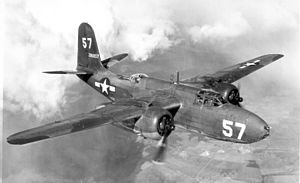No. 1459 (Fighter) Flight was formed at RAF Hunsdon, Hertfordshire on 20 September 1941, equipped with Turbinlite Douglas Boston and Douglas Havoc aircraft.[2] By 21 September 1941 the flight moved to RAF Hibaldstow, Lincolnshire.[3] On operations they cooperated with the Hawker Hurricanes of 253 Squadron.[4]
| No. 1459 Flight RAF | |
|---|---|
 An A-20 Havoc of the USAAF, like the ones used by the flight | |
| Active | 20 Sep 1941 – 2 Sep 1942 |
| Country | |
| Branch | |
| Role | Night Fighter (Turbinlite) |
| Part of | No. 12 Group RAF, Fighter Command[1] |
| Insignia | |
| Squadron Badge heraldry | No known badge |
| Squadron Codes | No known identification code for the flight is known to have been carried |
Description
edit1459 Flight was perhaps the most successful unit of its kind: after becoming operational in March 1942 they made their first target illumination was on 28 April 1942, but that night the satellite aircraft were not in position.[4] Two days later Flt/Lt. C.V. Winn illuminated a He 111 which fell victim to S/Ldr. Yapp of 253 sqn.[4][5] Three more contacts were made in May 1942, but all proved friendly.[4] In July by now S/Ldr. C.V. Winn scored a probable Do 217 and P/O J.A. Gunn another Do 217 damaged.[4] A further aircraft was claimed as damaged in August,[4] giving a total of one destroyed, one probable and two damaged.
The flight was replaced with 538 Squadron on 2 September 1942[3][6] but officially disbanded as late as 25 January 1943.[3] 538 Sqn, which had taken over men and machines, carried on flying the Turbinlite Bostons and Havocs till the system was abandoned on 25 January 1943,[7] when Turbinlite squadrons were, due to lack of success on their part and the rapid development of AI radar, thought to be superfluous.[8]
Aircraft operated
edit| From | To | Aircraft | Version |
|---|---|---|---|
| 20 September 1941 | 2 September 1942 | Douglas Havoc | Mk.I |
| 20 September 1941 | 2 September 1942 | Douglas Havoc | Mk.I (Turbinlite) |
| 20 September 1941 | 2 September 1942 | Douglas Havoc | Mk.II |
| 20 September 1941 | 2 September 1942 | Douglas Havoc | Mk.II (Turbinlite) |
| 20 September 1941 | 2 September 1942 | Douglas Boston | Mk.II (Turbinlite) |
| 20 September 1941 | 2 September 1942 | Douglas Boston | Mk.III |
| 20 September 1941 | 2 September 1942 | Douglas Boston | Mk.III (Turbinlite) |
Flight bases
edit| From | To | Base |
|---|---|---|
| 20 September 1941 | 21 September 1941 | RAF Hunsdon, Hertfordshire |
| 21 September 1941 | 2 September 1942 | RAF Hibaldstow, Lincolnshire |
Commanding officers
edit| From | To | Name |
|---|---|---|
| 20 September 1941 | March 1942 | S/Ldr. J.B. Nicholson, VC |
| March 1942 | May 1942 | S/Ldr. V.R. Oats |
| May 1942 | 2 September 1942 | S/Ldr. C.V. Winn, DFC |
References
edit- Notes
- Bibliography
- Delve, Ken. The Source Book of the RAF. Shrewsbury, Shropshire, UK: Airlife Publishing, 1994. ISBN 1-85310-451-5.
- Halley, James J. The Squadrons of the Royal Air Force & Commonwealth 1918-1988. Tonbridge, Kent, UK: Air Britain (Historians) Ltd., 1988. ISBN 0-85130-164-9.
- Jefford, C.G. RAF Squadrons, a Comprehensive record of the Movement and Equipment of all RAF Squadrons and their Antecedents since 1912. Shrewsbury, Shropshire, UK: Airlife Publishing, 1988 (second edition 2001). ISBN 1-85310-053-6.
- Lake, Alan. Flying Units of the RAF. Shrewsbury, Shropshire, UK: Airlife Publishing, 1999. ISBN 1-84037-086-6.
- Rawlings, John D.R. Fighter Squadrons of the RAF and their Aircraft. London: Macdonald & Jane's (Publishers) Ltd., 1969 (2nd edition 1976, reprinted 1978). ISBN 0-354-01028-X.
- Sturtivant, Ray, ISO and John Hamlin. RAF Flying Training And Support Units since 1912. Tonbridge, Kent, UK: Air-Britain (Historians) Ltd., 2007. ISBN 0-85130-365-X.